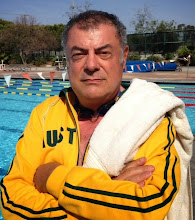They’re not exactly the Mormon Tabernacle Choir, or the Cathedral Choir of St. John the Divine in New York or Saint Sulpice in Paris. They’re a Pretty Darned Good civic choir in Pasadena, and as a PDG choir, they are one of hundreds around the country, made up of executives, teachers, house wives and musicians looking for meaningful expression in their lives.
I’m not denigrating the PDG Pasadena Master Chorale, it’s just that there are a lot of really wonderful choirs to be found, so in addition to their sweet tone, and their challenging selection of numbers, there had to be something else about tonight’s concert that touched me so much.
Yes, you’ve probably heard of Benjamin Brittten and even the renaissance writer Michael Praetorious, but have you ever heard of Morten Lauridsen or Henryk Gorecki? I hadn't either, so, no, it had to be something else.

As I sat there in the nave of the First Congregational Church, listening to the second part of the concert – selections from Handel’s Messiah – the warmth of the music washed over me and sent me deep into thoughtful revery.
So first off, it has to be that Mr. Handel hit me somewhere meaningful. At a time when central European powers, the Hapsburgs, the Bourbons, and the Maria Thereses are setting the tone of the late renaissance, a Brit stands out for having composed one of the great pieces of music in the western canon (well, one Brit who was a transplanted German). While his
“Music for the Royal Fireworks” and
“Water Music” are dazzling in their own right, it is squarely on the history and reputation of his great masterwork
“Messiah” (not THE Messiah!) that he has inspired and moved people, educated or not, since that day in 1742 when it debuted in a small concert hall in Dublin.
The quartet which led off this portion of the show here in Pasadena was sweet, and charming in its way. We could see that this would be a serious, if truncated version of the great oratorio, featuring just some highlights of the twenty-plus song cycle, sort of the ‘greatest-hits’ selections.
The early pieces
“And the Glory of the Lord” and
“Surely He Hath Born Our Griefs” were solid, competent and moving. And who can argue with the bombast and hummability of the Halleluja chorus.
But strangely for me, it was the ecstatic and lyrical
“For Unto Us a Child Is Born” that raised a lump in my throat.
I don’t think it was because of the religious sentiment – I’m far too cynical to succumb to that sort of thing.
Rather, I think it is that in this beautiful, joyful refrain, this most British of compositions (composed by a German nonetheless) captures the sense of western civilization as it is declaring itself the most important power on the planet. And when I say power, I don’t mean mere military might or commercial domination. Rather, I mean these tones, voices and instruments have been organized in a way that celebrates western civilization, that joyfully proclaim to the rest of the planet that our music – and by extension, our art, our architecture, our commerce, our literature – has triumphed over the lumpen anguish of the dark ages.
The beautiful passages taken from Isiah say that this is more than simple engineering, this is art, this is man’s highest aspiration, this is western civilization, with God on its side, triumphantly saying to the world:
“…the government shall be upon His shoulder;
and his name shall be called Wonderful,
Counsellor,
the Mighty God,
the Everlasting Father,
the Prince of Peace.We may have equaled those refrains since 1742 in great works by Beethoven, Haydn, and modern masters – Picasso, Frank Lloyd Wright, Faulkner – but we have never exceeded them.
 The heady years of the late seventies rush back to many of us, especially those with ties to San Francisco - remembering those rallies, marches and vigils in the Castro, and electrifying reality of gay pride, and the sense that the world really could be changed with just a few dedicated people standing up for what is right.
The heady years of the late seventies rush back to many of us, especially those with ties to San Francisco - remembering those rallies, marches and vigils in the Castro, and electrifying reality of gay pride, and the sense that the world really could be changed with just a few dedicated people standing up for what is right.
